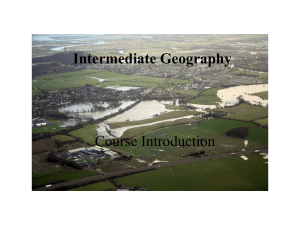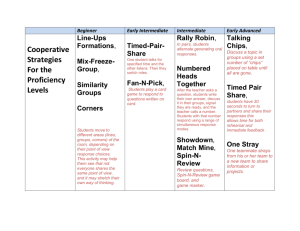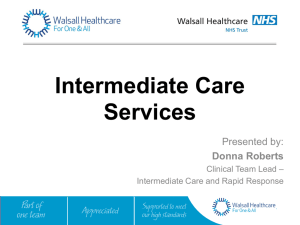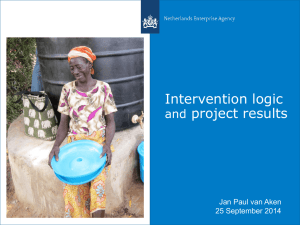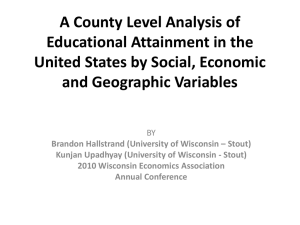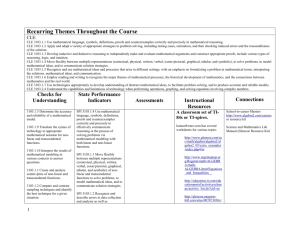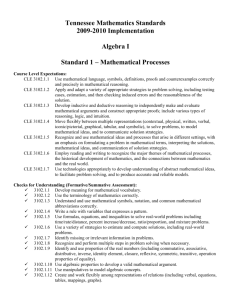2nd Progress Report MA Restructuring
advertisement
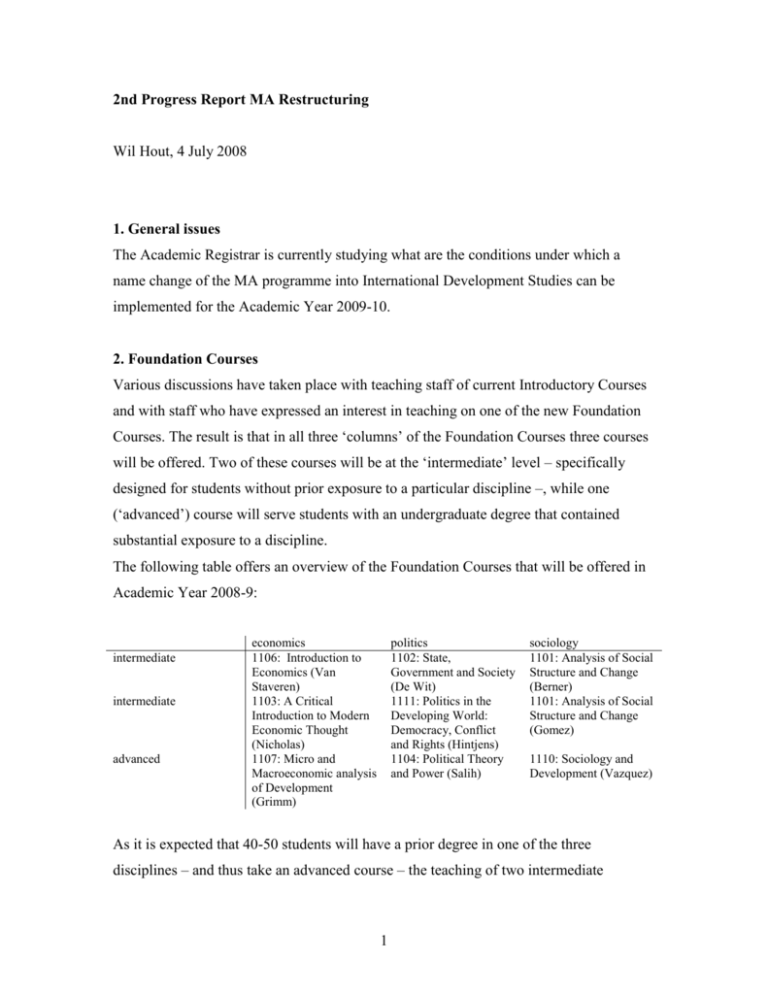
2nd Progress Report MA Restructuring Wil Hout, 4 July 2008 1. General issues The Academic Registrar is currently studying what are the conditions under which a name change of the MA programme into International Development Studies can be implemented for the Academic Year 2009-10. 2. Foundation Courses Various discussions have taken place with teaching staff of current Introductory Courses and with staff who have expressed an interest in teaching on one of the new Foundation Courses. The result is that in all three ‘columns’ of the Foundation Courses three courses will be offered. Two of these courses will be at the ‘intermediate’ level – specifically designed for students without prior exposure to a particular discipline –, while one (‘advanced’) course will serve students with an undergraduate degree that contained substantial exposure to a discipline. The following table offers an overview of the Foundation Courses that will be offered in Academic Year 2008-9: intermediate intermediate advanced economics 1106: Introduction to Economics (Van Staveren) 1103: A Critical Introduction to Modern Economic Thought (Nicholas) 1107: Micro and Macroeconomic analysis of Development (Grimm) politics 1102: State, Government and Society (De Wit) 1111: Politics in the Developing World: Democracy, Conflict and Rights (Hintjens) 1104: Political Theory and Power (Salih) sociology 1101: Analysis of Social Structure and Change (Berner) 1101: Analysis of Social Structure and Change (Gomez) 1110: Sociology and Development (Vazquez) As it is expected that 40-50 students will have a prior degree in one of the three disciplines – and thus take an advanced course – the teaching of two intermediate 1 Foundation Courses per discipline has the advantage that the number of students per course will be manageable (70-75 students per course). The second intermediate course and the advanced course in sociology have been organised to fill the gaps in that column. For the Academic Year 2009-10, a structural solution for the Foundation Courses in sociology will be in place. The intermediate course Politics in the Developing World: Democracy, Conflict and Rights is equally a temporary solution, as the preferred option of offering an intermediate course focusing on law and rights appeared not feasible for 2008-9. The organisation of such a course will, in all likelihood, be possible for the next Academic Year. The new intermediate course in politics (1111) may then be cancelled or be brought to the advanced level and merged with the existing Political Theory and Power (1104). After the summer, I will invite the Task Force MA Restructuring to discuss the learning objectives of all Foundation Courses in order to bring the course offerings in line with the learning objectives that have been formulated in the annexe to my 1st Progress Report. 3. Core Courses Some progress has been achieved with respect to the Core Courses. In addition to the changes indicated in the 1st Progress Report, it is now clear that a Core Course will be organised by the HDS and PAD specialisations, and one by G&D and IPED. The content and learning objectives of the Core Courses for 2009-10 will be discussed in the Task Force in the Fall. I intend to make a proposal on the Core Courses by the end of 2008, so that decision-making in the Academic Council can take place in early 2009. The proposal on the Core Courses will be accompanied by a review of term 2 and term 3 courses. In its advice of January 2008, the Teaching and Learning Committee had already indicated that the specialisation and optional courses of terms 2 and 3 show substantial overlaps. These overlaps will need to be addressed, and reduced wherever possible in order to enhance the efficiency of our teaching. Moreover, as indicated in discussions on the STAP system, many staff members feel that too many courses are offered in terms 2 and 3, and that reductions are needed to curb work pressure. It is obvious that the level of modularisation of our programme is quite limited – calculations by Marc Wuyts have shown that the current number of courses is 2 close to the number of courses that would need to be offered for fully self-standing specialisations – and that efficiency gains can be obtained by organising teaching activities better. 4. Research Methodology Workshop and Research Techniques Courses The Convenor for Research Methodology and Research Techniques has started discussions with representatives of specialisations and/or clusters on the organisation of Research Methodology Workshops as of November 2008. The reorganisation of the Research Methodology Courses into Research Techniques Courses in underway. The Convenor has proposed a substantially revised offering of courses, most of which are drawing on the current RMD Courses. The following courses are planned for Academic Year 2008-9: Course no. Course name ECs 3101 Research techniques for social scientists 7 3102 Techniques for understanding quantitative secondary data using Excel 3.5 3103 Regression and data analysis (offered in Term 1b) 3.5 3104 Doing your own survey 7 3105 Topics in regression analysis 3.5 3106 Exploratory data analysis with STATA 3.5 3107 Interviewing techniques and the use of ATLAS/ti for archiving and analysis 3.5 3108 Ethnographic techniques and cross-cultural reflexivity in case studies 3.5 3109 Group data collection and analysis techniques through PRA and focus groups 3.5 4112 Development research: comparative epistemologies and methodologies 7 4221 Discourse analysis: principles and techniques 7 N.B. Course names and numbers are subject to revision Communication to students will include a matrix that discusses possible choices, in particular related to the need to achieve 7 ECs from the 3.5 EC courses. Only a few of the combinations will be marked as undesirable in terms of pedagogic development or elements of overlap. 3 3102 3102 3103 3105 3106 3107 3108 N.B. 3103 N 3105 N R 3106 N R N 3107 Y Y R R 3108 Y Y Y Y Y 3109 Y Y R Y N N N = not recommended, Y = positively possible, R = recommended 4

